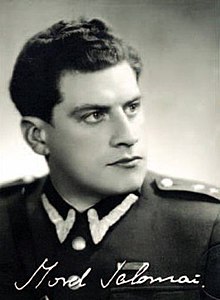Salomon Morel | |
|---|---|
 Salomon Morel in 1948 Morel was accused of war crimes and crimes against humanity in 1995 in absentia | |
| Born | November 15, 1919 |
| Died | February 14, 2007 (aged 87) |
| Citizenship | Polish, later Israeli |
| Occupation | officer at the Ministry of Public Security |
| Known for | Commander of Zgoda labour camp and Jaworzno concentration camp |
Salomon Morel (November 15, 1919 – February 14, 2007) was an officer in the Ministry of Public Security in the Polish People's Republic, and a commander of concentration camps run by the NKVD and communist authorities until 1956.
After Nazi Germany occupied Poland, Morel and his family went into hiding to avoid being placed in one of the Jewish ghettos in German-occupied Poland. Both Salomon and his brother survived part of the war and Holocaust under the protection of a local Polish farmer, before joining communist partisans.
In 1944 Morel became warden of the Soviet NKVD prison at Lublin Castle. During most of 1945, he was commander of the Zgoda labour camp in Świętochłowice.[1][2] In 1949 he was made commander of Jaworzno concentration camp and remained a commandant of numerous concentration camps until they were all closed down in 1956 following the Polish October. He then worked as head of prison in Katowice and was promoted to the rank colonel in the political police, the MBP. He was dismissed during the 1968 Polish political crisis which saw the purging of ex-Stalinists.[3]
Beginning in the early 1990s Morel was investigated by Institute of National Remembrance for war crimes and crimes against humanity, including the revenge killings[4] of more than 1,500 prisoners in Upper Silesia, most of whom were either native speakers of Silesian German or Polish political prisoners.[5][1][6][7] In 1996, he was indicted by Poland on charges of torture, war crimes, crimes against humanity and communist crimes.[3] After his case was publicized by the Polish, German, British, and American media, Morel fled to Israel and was granted citizenship under the Law of Return. Poland twice requested his extradition, once in 1998 and once in 2004, but Israel refused to comply and rejected the more serious charges as being false and again rejected extradition on the grounds that the statute of limitations against Morel had run out and that Morel was in poor health.[8] Polish authorities responded by accusing Israel of applying a double standard, and the controversy over Morel's extradition continued until his death.[5]
- ^ a b Cite error: The named reference
Lowewas invoked but never defined (see the help page). - ^ Cite error: The named reference
Gruschkawas invoked but never defined (see the help page). - ^ a b Applebaum, Anne (2012). Iron Curtain: The Crushing of Eastern Europe, 1944–1956. Knopf Doubleday Publishing Group. ISBN 9780385536431.
Salomon Morel war criminal.
- ^ Sack, John (1995). An Eye For An Eye: The Untold Story Of Jewish Revenge Against Germans In 1945. Basic Books. ISBN 9780465022151.
- ^ a b Cite error: The named reference
BBCwas invoked but never defined (see the help page). - ^ Piotrowski, Tadeusz (1998). Poland's Holocaust: Ethnic Strife, Collaboration with Occupying Forces and Genocide in the Second Republic, 1918-1947. McFarland. ISBN 9780786403714.
- ^ Cite error: The named reference
independentwas invoked but never defined (see the help page). - ^ Remembrance, Institute of National. "Response by the State of Israel to the application for the extradition of Salomon Morel and a report by Dr. Adam Dziurok and Prosecutor Andrzej Majcher on the subject of Salomon Morel and the history and operation of the camp at Świętochłowice-Zgoda". Institute of National Remembrance.